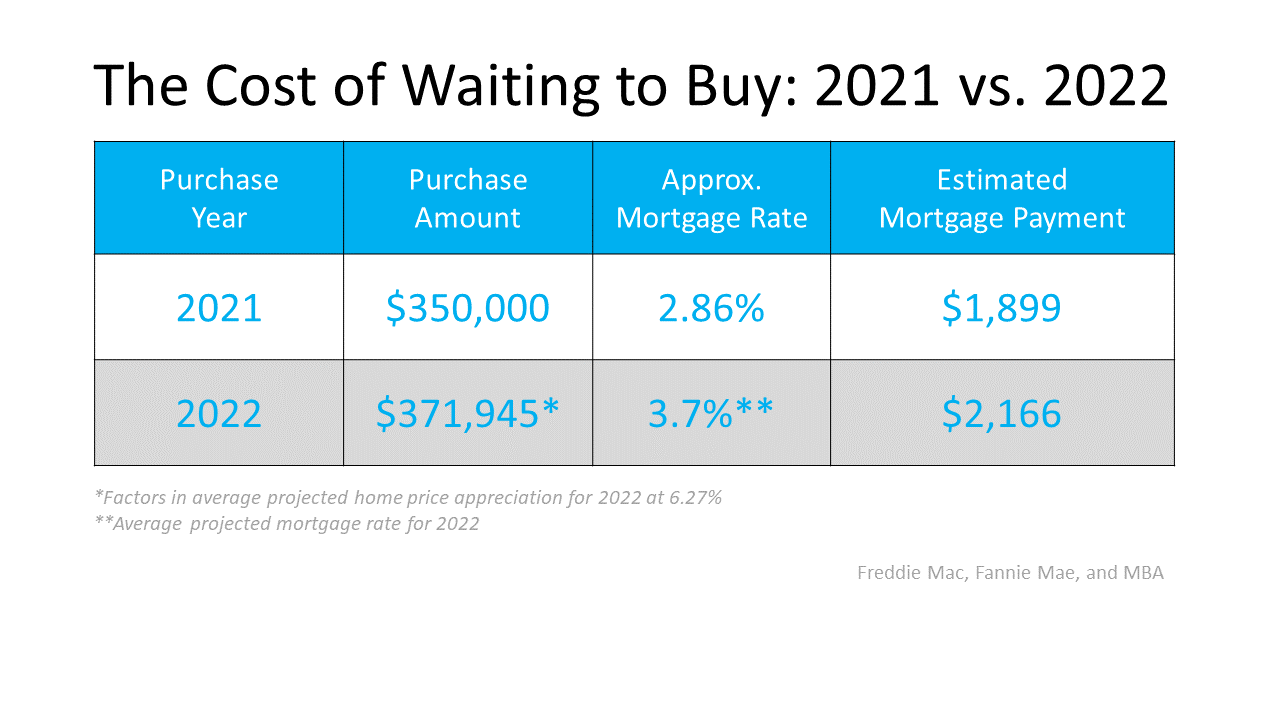
“If you’re a renter with a desire to become a homeowner, you may be hoping that waiting a year might mean better market conditions to purchase a home.”
If you’re a renter with a desire to become a homeowner, or a homeowner who’s decided your current house no longer fits your needs, you may be hoping that waiting a year might mean better market conditions to purchase a home.
To determine if you should buy now or wait, you need to ask yourself two simple questions:
- What will home prices be like in 2022?
- Where will mortgage rates be by the end of 2022?
Let’s shed some light on the answers to both of these questions.
What will home prices be like in 2022?
Three major housing industry entities project continued home price appreciation for 2022. Here are their forecasts:
- Freddie Mac: 5.3%
- Fannie Mae: 5.1%
- Mortgage Bankers Association: 8.4%
Using the average of the three projections (6.27%), a home that sells for $350,000 today would be valued at $371,945 by the end of next year. That means, if you delay, it could cost you more. As a prospective buyer, you could pay an additional $21,945 if you wait.
Where will mortgage rates be by the end of 2022?
Today, the 30-year fixed mortgage rate is hovering near historic lows. However, most experts believe rates will rise as the economy continues to recover. Here are the forecasts for the fourth quarter of 2022 by the three major entities mentioned above:
- Freddie Mac: 3.8%
- Fannie Mae: 3.2%
- Mortgage Bankers Association: 4.2%
That averages out to 3.7% if you include all three forecasts, and it’s nearly a full percentage point higher than today’s rates. Any increase in mortgage rates will increase your cost.
What does it mean for you if both home values and mortgage rates rise?
You’ll pay more in mortgage payments each month if both variables increase. Let’s assume you purchase a $350,000 home this year with a 30-year fixed-rate loan at 2.86% after making a 10% down payment. According to the mortgage calculator from Smart Asset, your monthly mortgage payment (including principal and interest payments, and estimated home insurance, taxes in your area, and other fees) would be approximately $1,899.
That same home could cost $371,945 by the end of 2022, and the mortgage rate could be 3.7% (based on the industry forecasts mentioned above). Your monthly mortgage payment, after putting down 10%, would increase to $2,166.
The difference in your monthly mortgage payment would be $267. That’s $3,204 more per year and $96,120 over the life of the loan.
If you consider that purchasing now will also let you take advantage of the equity you’ll build up over the next calendar year, which is approximately $22,000 for a house with a similar value, then the total net worth increase you could gain from buying this year is over $118,000.
Bottom Line
When asking if you should buy a home, you probably think of the non-financial benefits of owning a home as a driving motivator. When asking when to buy, the financial benefits make it clear that doing so now is much more advantageous than waiting until next year.
To view original article, visit Keeping Current Matters.
Worried about Home Maintenance Costs? Consider This
If you’re worried about home maintenance, here’s some information you may find interesting.
What’s Next for Home Prices and Mortgage Rates?
If you’re ready, willing, and able to afford a home right now, partner with a trusted real estate advisor to decide what’s right for you.
The Number of Homes for Sale Is Increasing
In today’s homebuying market, it’s more important than ever to find a real estate agent who really knows your local area.
Thinking of Selling? You Want an Agent with These Skills
A great agent will be very good at explaining what’s happening in the housing market in a way that’s easy to understand.
Home Prices Are Climbing in These Top Cities
Persistent demand coupled with limited housing supply are key drivers pushing home values upward.
How Buying or Selling a Home Benefits Your Community
It makes sense that housing creates a lot of jobs because so many different kinds of work are involved in the industry.







.jpg )



